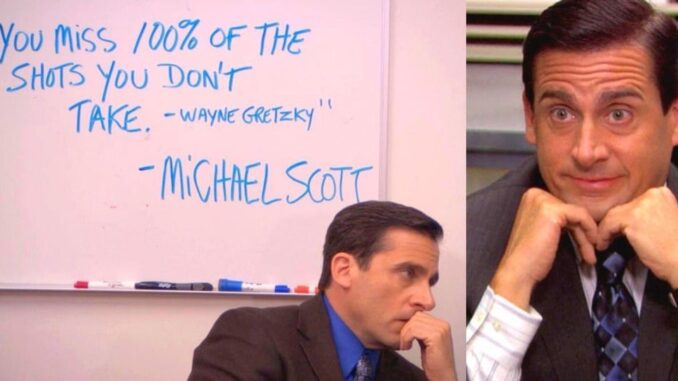
How to Command a Room Like Michael Scott
To "command a room" traditionally implies gravitas, eloquent speech, and an aura of effortless authority. It conjures images of powerful leaders, captivating speakers, or charismatic personalities who effortlessly draw attention and respect. However, there exists another, far more peculiar school of room-commanding, one perfected by the regional manager of Dunder Mifflin Scranton, Michael Gary Scott. His method is not one of respect or admiration, but of sheer, unadulterated, cringe-inducing magnetism. To command a room like Michael Scott is not to lead it, but to utterly dominate its every thought and feeling through a potent cocktail of discomfort, delusion, and an unwavering belief in one's own comedic genius.
The first, and perhaps most crucial, step in mastering Michael Scott’s brand of room command is the unwavering commitment to the bit, no matter how ill-conceived or offensive. Michael doesn't just tell jokes; he becomes the joke, often to the profound detriment of social harmony. Picture, if you will, the classic meeting where important information needs to be conveyed. A traditional leader might use a compelling narrative or clear bullet points. Michael, on the other hand, might launch into an impromptu stand-up routine featuring painfully stereotypical accents, a convoluted storyline involving his own romantic woes, or a game of "that's what she said" taken to its illogical extreme. The room falls silent, not out of reverence, but out of a collective, horrified paralysis. Eyes dart around, searching for a sympathetic glance, a shared sigh. But all eyes are, undeniably, on Michael. He has seized the room, not through the power of his words, but through the terrifying vacuum of silence and secondhand embarrassment his words create.
Secondly, and intrinsically linked to the first, is the art of relentless emotional transparency, bordering on public meltdown. Most people endeavor to maintain a professional facade in a group setting. Michael, however, views a room as his personal therapy session, a stage for his every fleeting emotion. Did a coworker slight him? The room will witness his dramatic pout, his forced stoicism, and eventually, his tearful outburst. Is he feeling ignored? He will demand attention with a bizarre grand gesture, like faking a heart attack during a fire drill or delivering a heartfelt, unsolicited lecture on the dangers of the internet. These moments are not designed to inspire or motivate; they are designed to hijack the emotional bandwidth of everyone present. People are held captive, not by his wisdom, but by the sheer, unblinking spectacle of his raw vulnerability. It’s the human equivalent of a car crash – you desperately want to look away, but you simply cannot.
Third, a true Michael Scott room commander must cultivate a profound and utterly unshakeable “main character syndrome.” In Michael’s world, every meeting, every conversation, every office event, is merely a backdrop for his personal narrative. A company safety briefing transforms into a diatribe about his unique perils. A client presentation becomes an opportunity to showcase his questionable musical talents. This isn't about contributing to a group dynamic; it’s about ensuring that all roads lead back to him. When he walks into a room, the air immediately shifts. There's a palpable tension, an unspoken question: "What will Michael do now?" This anticipatory dread, ironically, grants him absolute command. Everyone is braced, waiting, and thus, utterly engaged with his every move. His presence demands an audience, not because he's earned it, but because he simply expects it.
Finally, and perhaps most subtly, Michael’s command stems from his complete and utter lack of self-awareness, coupled with an unwavering, often delusional, confidence. He truly believes he is the funniest, most charming, and most beloved person in the room, despite overwhelming evidence to the contrary. He will confidently deliver a racially insensitive joke, only to be genuinely confused by the ensuing silence. He will proudly present a terrible idea, convinced it's genius. This bizarre disconnect between perception and reality is disarming. It forces others to react, to correct, to explain, or simply to gape in disbelief. His confidence acts as a vacuum, sucking up all available attention as people try to reconcile what they are seeing and hearing with any semblance of normal human behavior.
In conclusion, commanding a room like Michael Scott is not for the faint of heart, nor for those who value respect, efficiency, or social grace. It is a masterclass in unintentional disruption, a testament to the power of pure, unadulterated discomfort. It involves embracing the cringe, baring one’s soul (and then some), hogging the spotlight, and operating under a perpetual, blissful delusion of grandeur. While no one would actively advise aspiring leaders to emulate his techniques, one cannot deny their undeniable effectiveness. Michael Scott may not command a room through traditional leadership, but he commands it nonetheless – every awkward silence, every forced laugh, and every horrified gasp, all belonging to him.
@quicklaughs22 how to get people’s attention in Michal Scott’s way. 😆 #theoffice #theofficeus #michalscott #stevecarell #comedy #quicklaughs